List of enlightened despots
An Enlightened despot (also called benevolent despot) is an authoritarian or non-democratic leader who exercises his political power for the benefit of the people, rather than exclusively for themselves or for an elite or small portion of the people.
Historically they were monarchs making use of enlightened ideas and principles in order to enhance the central government's power (thereby their own power).[1] Most were directly linked to the Enlightenment period in the 18th and early 19th centuries.
Characteristics
Enlightened despots were monarchs who distinguished themselves from despots (in the ordinary sense) by the way they governed; they claimed to rule for the well-being of their subjects. For example, an enlightened despot may focus government priorities on matters of public importance such as healthcare, education, nonviolent population control, or physical infrastructure. He or she may be committed to peaceful relations and may even allow for some democratic decision-making to exist, such as public referendums, but did not propose reforms that would undermine their sovereignty or disrupt social order. As John Stuart Mill articulated: "Despotism is a legitimate mode of government in dealing with barbarians, provided the end be their improvement."[2]
Although their reigns were based upon Enlightenment principles, their beliefs about royal power were similar to those of regular despots. Enlightened despots believed that they were destined to be ruler the moment they were born.
Enlightened rulers may have played a part in the abolition of serfdom in Europe.[3]
Emperor Joseph II once said: "Everything for the people, nothing by the people".[4]
Most dictatorial regimes portray themselves as enlightened and often tend to regard democratic regimes as messy, inefficient, and corrupt. Additionally, many dictators may attempt to openly spread misinformation about their enlightenment, real or assumed, in an attempt to create a personality cult.
In the Spanish language the word dictablanda is sometimes used for a dictatorship that preserves some of the liberties and mechanisms of democracy.
Famous enlightened despots
The most famous enlightened despots in history were:
- Catherine the Great of Russia[5]
- Carlos III of Spain[6]
- Frederick the Great of Prussia[7]
- Frederick VI of Denmark[8]
- Gustav III of Sweden[8]
- Joseph II, Holy Roman Emperor of Austria[6]
- Joseph I of Portugal
- Maria Theresa of Austria
- The Medici dynasty
- Leopold I, Grand Duke of Tuscany[6]
- Louis XVI of France[6]
- Maria Carolina of Austria, Queen of Naples[9]
- Christian VII of Denmark (through his minister Johann Friedrich Struensee)
- Napoleon Bonaparte
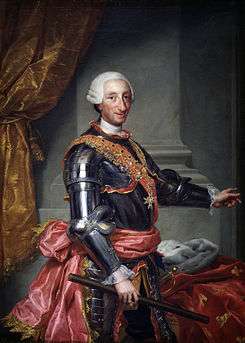
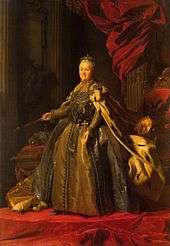
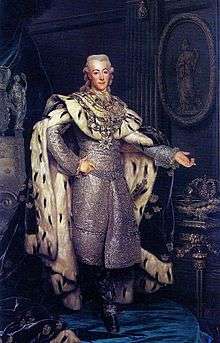
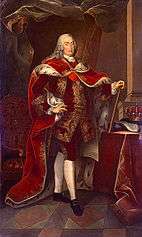
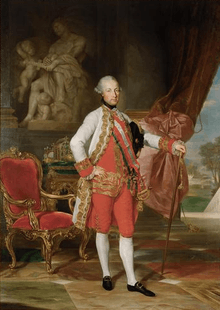
%2C_rev%C3%AAtu_du_grand_costume_royal_en_1779_-_Google_Art_Project.jpg)
Enlightened despots in recent history
Like many political classifications, the title of enlightened despot suffers from its inherent subjectivity. In recent history strong, ruthless dictators such as Fidel Castro, Lee Kuan Yew, António Salazar, Francisco Franco, Isaias Afwerki, Park Chung-hee, Mustafa Kemal Atatürk, Augusto Pinochet, Chiang Kai-shek, Pervez Musharraf, Thomas Sankara, Muammar Gaddafi, Saddam Hussein and Bashar al-Assad can be characterized as enlightened despots. In all of these cases the point of view as to just how "enlightened" or "dictatorial" they are is largely subjective.
Generally, dictators who serve in office for a very long period are more likely to be regarded as enlightened because they will often be forced to pay some attention to the public interest in order to remain in power and, more importantly, to be regarded as legitimate. Dictators who hold office for a brief period of time or are simply members of a rotating dictatorial elite (such as those heading some juntas) may have less charismatic authority and prove to be forgettable and are therefore often easier to demonize. In the cases of dictators such as Saddam Hussein and Muammar Gaddafi their enlightened qualities became apparent only in the wake of the breakdown of state institutions and persecution of religious and ethnic minorities that followed their removal from power.[10]
See also
Notes
- ↑ Perry, Chase & Jacob 2015, p. 442.
- ↑ Mill 1989, p. 13.
- ↑ "Disappearance of Serfdom. France. England. Italy. Germany. Spain.". www.1902encyclopedia.com. Retrieved 2015-12-07.
- ↑ World of the Habsburgs. "Joseph II: The long-awaited son". Textmode. World of the Habsburgs. Retrieved 2015-10-21.
‘Everything for the people, nothing by the people’
- ↑ McKay, "A History of Western Society", Houghton Mifflin Company, 2006, p.616-619
- Catherine the Great: Portrait of a Woman R K. Massie, "Catherine the Great: Portrait of a Woman", Random House, 2012
- 1 2 3 4 H.M. Scott, 1990, p. 1.
- ↑ H.M. Scott, 1990, p. 265ff
- 1 2 H. Arnold Barton, Scandinavia in the Revolutionary Era 1760-1815, University of Minnesota Press, 1986, p.142ff. ISBN 0-8166-1392-3.
- ↑ Bearne, Catherine Mary (1907). A Sister of Marie Antoinette: The Life-Story of Maria Carolina, Queen of Naples. T. Fisher Unwin: London, p 142.
- ↑ Neutral Politics
References
- Biography.com Editors. "Joseph II Biography". A&E Television Networks. Retrieved 2015-10-21.
- Mill, John Stuart (25 August 1989). J. S. Mill: 'On Liberty' and Other Writings. Cambridge University Press. ISBN 978-0-521-37917-5.
- Perry, Marvin; Chase, Myrna; Jacob, James; Jacob, Margaret; Daly, Jonathan (1 January 2015). Western Civilization: Ideas, Politics, and Society, Volume I: To 1789. Cengage Learning. ISBN 978-1-305-44548-2. Retrieved 20 September 2015.
- World of the Habsburgs. "Joseph II: The long-awaited son". Textmode. World of the Habsburgs. Retrieved 2015-10-21.
‘Everything for the people, nothing by the people’
- [1]